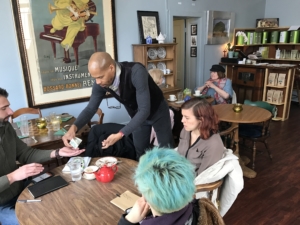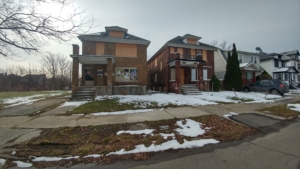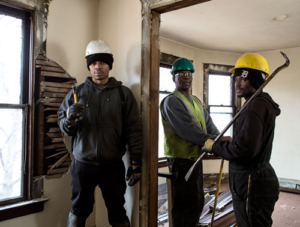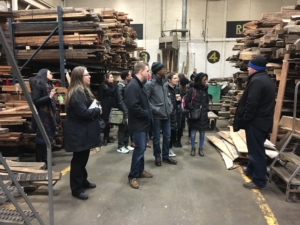EcoWorks was a challenge partner for the fourth challenge project. EcoWorks is a Detroit-based nonprofit providing service at the intersection of community development and sustainability. The teams of fellows worked with EcoWorks to support two of their programs, Eco-D and Reclaim Detroit.
Eco-D is an initiative to help neighborhoods adopt sustainable practices. The initiative established two EcoDistricts in Detroit, West Village on Detroit’s eastside, and Hope Village in the heart of the city. In both neighborhoods, Eco-D is targeting accessible, low-carbon mobility, and innovative, sustainable use of vacant property, and green buildings.
Reclaim Detroit has pioneered and proved deconstruction as a green alternative to building demolition and blight removal. The program provides certified jobs in environmental and deconstruction fields for local people facing barriers to employment.
During the five weeks of the challenge, the fellows spent a lot of time in their respective communities learning about their neighborhoods and residents, but also about patterns of work, travel, and life. They conducted interviews, adventured throughout their communities, captured stories and built relationships with others, but most importantly, they let the voice of community inspire their creative process.
Team #1: West Village EcoDistrict Team
 The West Village Team was posed with the design question How might we design a mobility strategy to alleviate traffic and car dependency in the West Village EcoDistrict? They started by defining what mobility meant to West Village residents, learning that mobility choices are highly influenced by how comfortable residents feel in their own neighborhood. Their recommendations center around education and communication initiatives, as well as community building events. They developed a welcome packet for new members of the community with valuable information for navigating through their neighborhood, hoping to empower residents to ditch their cars for a day, walk to local business, and greet their neighbors on the streets.
The West Village Team was posed with the design question How might we design a mobility strategy to alleviate traffic and car dependency in the West Village EcoDistrict? They started by defining what mobility meant to West Village residents, learning that mobility choices are highly influenced by how comfortable residents feel in their own neighborhood. Their recommendations center around education and communication initiatives, as well as community building events. They developed a welcome packet for new members of the community with valuable information for navigating through their neighborhood, hoping to empower residents to ditch their cars for a day, walk to local business, and greet their neighbors on the streets.
Team #2: Hope Village EcoDistrict Team
 The Hope Village Team was asked the design question How might we build awareness of Hope Village as an EcoDistrict and involve residents and business owners in community and sustainability events and projects? Their biggest insight was that sustainability in Hope Village did not look like sustainability in other neighborhoods. They looked to redefine what being an Eco-D meant for Hope Village, proposing the tagline “a stable today for a sustainable tomorrow”. They also designed a Community Asset Map that connects places that you might just drive by to stories and a broader initiative. They hope to empower residents to take pride in their community and work to implement sustainable strategies that save money, beautify blocks, provide access to fresh food and build meaningful relationships.
The Hope Village Team was asked the design question How might we build awareness of Hope Village as an EcoDistrict and involve residents and business owners in community and sustainability events and projects? Their biggest insight was that sustainability in Hope Village did not look like sustainability in other neighborhoods. They looked to redefine what being an Eco-D meant for Hope Village, proposing the tagline “a stable today for a sustainable tomorrow”. They also designed a Community Asset Map that connects places that you might just drive by to stories and a broader initiative. They hope to empower residents to take pride in their community and work to implement sustainable strategies that save money, beautify blocks, provide access to fresh food and build meaningful relationships.
Team #3: Reclaim Detroit Job Training Storytelling Team
 The Reclaim Detroit Job Training Storytelling Team asked How might we use storytelling to build awareness of job training as a key element of the social mission of Reclaim Detroit? The team learned that there is a very tight window for capturing stories from trainees, especially once they graduate from the program. Their recommendations were presented in a report outlining the process for collecting stories, including the formation of an alumni network, and a communication plan for how to share these stories. The team compiled quotes, stories, and even developed graphic content for Reclaim Detroit to share their story on different forms of media, to tell the story to others and attract more trainees to the program.
The Reclaim Detroit Job Training Storytelling Team asked How might we use storytelling to build awareness of job training as a key element of the social mission of Reclaim Detroit? The team learned that there is a very tight window for capturing stories from trainees, especially once they graduate from the program. Their recommendations were presented in a report outlining the process for collecting stories, including the formation of an alumni network, and a communication plan for how to share these stories. The team compiled quotes, stories, and even developed graphic content for Reclaim Detroit to share their story on different forms of media, to tell the story to others and attract more trainees to the program.
Team #4: Reclaim Detroit Job Trainee Feedback Team
 The Reclaim Detroit Trainee Feedback Team was posed with the design question How might we incorporate trainee feedback to improve future training for Detroiters seeking jobs in environmental construction and deconstruction? The team talked to current and former trainees to learn how the program (skill content, delivery, and on-the-job training) was helpful to getting jobs in these fields. One of their recommendations came in the form of a Monitoring, Reporting, and Evaluation Tool Kit to be used by Reclaim Staff with each new program cohort. The other recommendations were provided in a report outlining important strategies for empowering the trainees, retaining the trainees as alumni of the program, the possibility of providing expungement services for trainees, and career opportunities for those who graduate out of the program.
The Reclaim Detroit Trainee Feedback Team was posed with the design question How might we incorporate trainee feedback to improve future training for Detroiters seeking jobs in environmental construction and deconstruction? The team talked to current and former trainees to learn how the program (skill content, delivery, and on-the-job training) was helpful to getting jobs in these fields. One of their recommendations came in the form of a Monitoring, Reporting, and Evaluation Tool Kit to be used by Reclaim Staff with each new program cohort. The other recommendations were provided in a report outlining important strategies for empowering the trainees, retaining the trainees as alumni of the program, the possibility of providing expungement services for trainees, and career opportunities for those who graduate out of the program.
In just 5 weeks the teams successfully developed strategies for the continuous improvement of both the Eco-D initiatives and Reclaim Detroit’s Job Training Program. The teams worked together throughout the Challenge, sharing resources and insights across projects. The Eco-D teams learned that sustainability does not have the same meaning in every community and came up with creative ways to communicate it and inspire active participation from residents. The Reclaim Detroit teams did an incredible job capturing the inspiration of the job training program with shareable stories and provided thoughtful resources for enhancing the program in the future. Together the teams came up with great recommendations for improving the work of EcoWorks in a meaningful and strategic way that appropriately reaches and targets its community in the city the of Detroit.
This blog was written by current Fellows Miranda Day and Shaina Davidson who served as Project Coordination Leads for this challenge.
